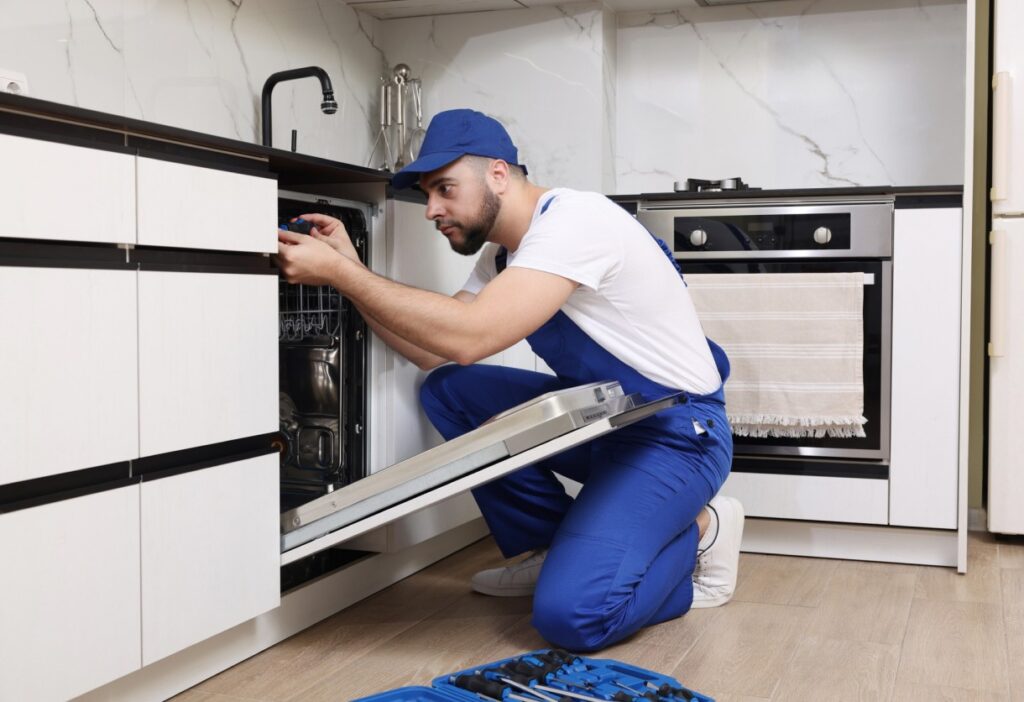When your dishwasher stops cleaning effectively, it can be incredibly frustrating. From greasy plates to cloudy glassware, a poorly performing dishwasher can disrupt your entire kitchen routine. In this guide, we’ll explore the most common reasons why dishwashers fail to clean properly and provide actionable solutions to get yours back in top shape.
Common Causes of Poor Dishwasher Performance
1. Clogged or Dirty Spray Arms
The spray arms in your dishwasher distribute water throughout the appliance to clean your dishes. Over time, food particles, grease, and mineral deposits can clog the holes in the spray arms, reducing water pressure and coverage.
How to Fix:
- Remove the spray arms following your manufacturer’s instructions.
- Rinse them under hot water and use a toothpick or small brush to clear debris from the holes.
- Soak in vinegar if there’s visible hard water buildup.
2. Filter Is Dirty or Blocked
The dishwasher filter traps food particles and prevents them from recirculating onto dishes. If it’s clogged, water may not drain properly, and debris could stay on your dishes.
Solution:
- Locate the filter at the bottom of the dishwasher (usually under the lower rack).
- Remove and rinse it under warm water using a soft brush to scrub away grime.
- Clean it once a month to maintain optimal performance.
3. Low Water Temperature
Dishwashers need hot water (at least 120°F or 49°C) to break down grease and clean effectively. If the water isn’t hot enough, your dishes won’t get clean.
Tips to Resolve:
- Run the hot water in your sink before starting the dishwasher to preheat the water supply.
- Check your water heater temperature settings.
4. Overloading or Incorrect Loading
Packing the dishwasher too full or placing items incorrectly can block the spray arms and prevent water from reaching all surfaces.
Loading Tips:
- Place large items like pots and pans on the sides or bottom rack.
- Ensure dishes don’t overlap or block each other.
- Leave enough space for spray arms to spin freely.
5. Using the Wrong Detergent
Not all detergents work equally well. Using low-quality, expired, or the wrong type of detergent can result in residue on dishes.
What to Do:
- Use high-quality detergent recommended for your water hardness level.
- Check if your detergent is expired or clumped.
- Consider switching to dishwasher pods for consistent results.
Advanced Issues That May Require Professional Help
1. Malfunctioning Circulation Pump
If the pump is weak or damaged, it won’t push water through the spray arms effectively, leading to poorly cleaned dishes.
2. Faulty Heating Element
The heating element ensures water reaches the proper temperature and helps dry dishes. If it’s broken, you may notice cold water or wet dishes after the cycle.
3. Water Inlet Valve Issues
This valve controls the flow of water into your dishwasher. If it’s clogged or defective, insufficient water may enter the machine, causing incomplete cleaning.
Note:
Diagnosing and fixing these components often requires tools and expertise. Contact a qualified appliance repair technician if basic troubleshooting doesn’t solve the issue.
Preventive Maintenance Tips
Keep It Clean
- Run a monthly cleaning cycle using a dishwasher cleaner or vinegar.
- Wipe down door seals and edges to remove grime buildup.
Use Rinse Aid
Rinse aid helps prevent spots and boosts drying performance, especially in hard water areas.
Run Hot Water First
Before starting your dishwasher, run hot water in your sink until it’s fully heated. This ensures the first fill is already warm.
Inspect and Replace Parts
Check spray arms, racks, and filters regularly. Replace any parts that show wear or damage to maintain performance.
When to Replace Your Dishwasher
Signs It May Be Time:
- Your dishwasher is over 10 years old.
- Multiple parts have failed or need replacing.
- It’s significantly less energy-efficient than newer models.
Newer dishwashers often offer better performance, energy efficiency, and quieter operation. If repairs exceed half the cost of a new machine, replacement might be the smarter option.
Conclusion
A dishwasher that doesn’t clean properly can often be restored with a few simple maintenance steps or minor adjustments. From cleaning spray arms to adjusting loading techniques, many problems are easy to fix. However, don’t hesitate to call a professional if you suspect a mechanical issue. Keeping your dishwasher in top condition ensures clean dishes—and a smoother kitchen routine—every day.

